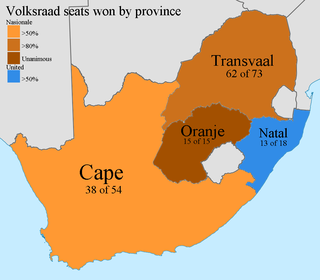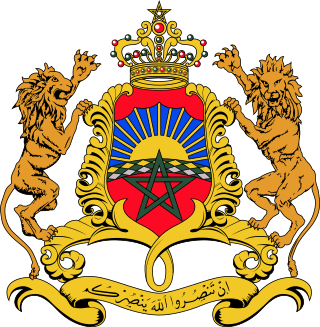
The Parliament of the Republic of South Africa is South Africa's legislature; under the present Constitution of South Africa, the bicameral Parliament comprises a National Assembly and a National Council of Provinces. The current twenty-seventh Parliament was first convened on 22 May 2019.

General elections were held in South Africa on Wednesday, 14 April 2004. The African National Congress (ANC) of President Thabo Mbeki, which came to power after the end of the apartheid system in 1994, was re-elected with an increased majority.

Elections in Egypt are held for the President and a bicameral legislature. The President of Egypt is elected for a six-year term by popular vote after draft amendments to the 2013 constitution altered the presidential term limits from the original four years to six years.

Elections in Kenya take place within the framework of a multi-party democracy and a presidential system. The President, Senate and National Assembly are directly elected by voters, with elections organised by the Independent Electoral and Boundaries Commission (IEBC).

Elections in Zambia take place within the framework of a multi-party democracy and a presidential system. The President and National Assembly are simultaneously elected for five-year terms.

The New Zealand electoral system has been mixed-member proportional (MMP) since the 1996 election. MMP was introduced following a referendum in 1993. It replaced the first-past-the-post (FPP) system New Zealand had previously used for most of its history. Under MMP, New Zealanders have two votes to elect members of Parliament (MPs). The first vote is for a candidate from an electorate. The second is the party vote – for the political party the voter wants to form the government.

General elections were held in South Africa on 15 April 1953. The elections consolidated the position of the National Party under D. F. Malan, which won an absolute majority of the 156 elected seats in the House of Assembly, also receiving the most votes. Its first-time majority of the white electorate would be retained until the 1989 elections.

General elections were held in South Africa on 16 April 1958. The result was a victory for the National Party, now under the leadership of J.G. Strijdom after the retirement of Daniel Malan in 1954. The opposition United Party campaigned for the first time under De Villiers Graaff, who would remain party leader for two decades.

General elections were held in South Africa on 30 March 1966. The result was another comprehensive victory for the National Party under Hendrik Frensch Verwoerd.

General elections were held in South Africa on 7 July 1943 to elect the 150 members of the House of Assembly. The United Party of Jan Smuts won an absolute majority.

The Representation of the People (Ireland) Act 1832, commonly called the Irish Reform Act 1832, was an Act of Parliament that introduced wide-ranging changes to the election laws of Ireland. The act was passed at approximately the same time as the Reform Act 1832, which applied to England and Wales.

Parliamentary elections were held for the first time in Morocco on 17 May 1963. They followed the approval of a constitution in a referendum the previous year. The result was a victory for the pro-Monarchy Front for the Defence of Constitutional Institutions (FDIC), which won 69 seats. However, the two main opposition parties, the Istiqlal Party and the National Union of Popular Forces, won exactly the same number of seats. Voter turnout was 71.8%. However, in November the Supreme Court annulled the results of several seats won by the opposition. By-elections held in January 1964 gave the FDIC control of Parliament, which was eventually dissolved by King Hassan II in 1965.

Parliamentary elections were held in Morocco on 14 September 1984, having originally been scheduled for September 1983, but postponed due to issues over the future of Western Sahara. The number of directly elected seats increased from 176 to 199, whilst the number of indirectly elected seats rose from 88 to 102. The indirectly elected seats were chosen on 2 October.

Parliamentary elections were held in Morocco on 25 June 1993, having originally been scheduled for October 1990, but postponed due to issues over the future of Western Sahara and a referendum on a new constitution, which took place in 1992. The number of directly elected seats increased from 204 to 222, whilst the number of indirectly elected seats rose from 102 to 111. The indirectly elected seats were chosen on 17 September.

A constitutional referendum was held in Morocco on 1 March 1972. The new constitution replaced that approved by referendum in 1970, and was drawn up after an attempted coup in July 1971 forced King Hassan II to accept the need for a broader government.

A referendum on extending the parliamentary mandate was held in Morocco on 1 December 1989. As elections had been held in 1984, the six-year term for Parliament due to expire in 1990. The decision was approved by 100% of voters, with a 98.8% turnout.

A constitutional referendum was held in Morocco on 13 September 1996. The new constitution created a bicameral Parliament by adding the Assembly of Councillors to the existing Assembly of Representatives. The 270-seat Assembly of Councillors would be indirectly elected by local councillors, chambers of commerce (81), and trade unions (27), whilst the 325-seat Assembly of Representatives would now be entirely directly elected. The changes were approved by 99.5% of voters, with an 85% turnout. Fresh elections were held the following year.

A referendum on constitutional reforms was held in Morocco on 1 July 2011. It was called in response to a series of protests across Morocco that began on 20 February 2011 when over ten thousand Moroccans participated in demonstrations demanding democratic reforms. A commission was to draft proposals by June 2011. A draft released on 17 June foresaw the following changes:
The Coloured vote constitutional crisis, also known as the Coloured vote case, was a constitutional crisis that occurred in the Union of South Africa during the 1950s as the result of an attempt by the Nationalist government to remove coloured voters in the Union's Cape Province from the common voters' rolls. It developed into a dispute between the judiciary and the other branches of government over the power of Parliament to amend an entrenched clause in the South Africa Act and the power of the Appellate Division to overturn the amendment as unconstitutional. The crisis ended when the government enlarged the Senate and altered its method of election, allowing the amendment to be successfully enacted.

General elections were held in Morocco on 8 September 2021 to elect 395 members of the House of Representatives. The National Rally of Independents led by Aziz Akhannouch won the most seats (102), a gain of 65 seats from the prior election. The liberal Authenticity and Modernity Party (PAM) took second place with 87 seats, a net loss of 15 seats. The centre-right Istiqlal Party gained 35 seats and took third place with 81 seats total. The governing Justice and Development Party suffered an electoral wipeout and won only 13 seats, a net loss of 112 seats for the party.












